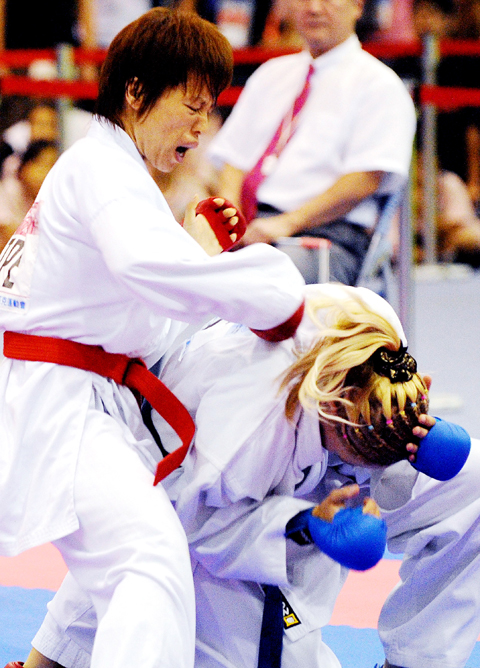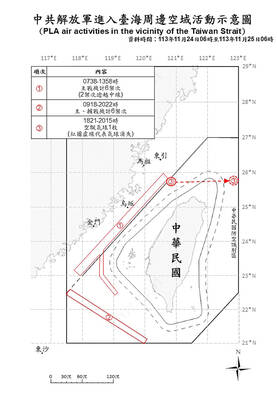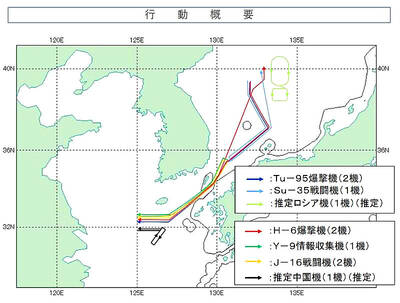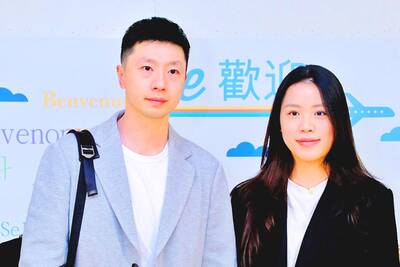The 21st Deaflympics finished just under a month ago, but for many of Taiwan’s athletes, the end of the Games meant the beginning of a new struggle.
After working hard to win medals and glory for the country, they now find themselves with a whole new challenge — winning bread for their families.
During the games, local athletes struck gold on 11 occasions, with a total of 33 medals won in singles and group events.

PHOTO: CNA
To boost the spirit of the Taiwanese sportsmen, the Sports Affairs Council (SAC) increased the cash prizes for all medal winners.
For gold medal winners, the prize money was raised from NT$750,000 to NT$1.8 million (US$55,000). The prize for a silver medal was increased to NT$1.08 million from NT$450,000, and a bronze earned the athlete NT$630,000, a NT$400,000 increase over the previous prize.
Those who placed fourth and fifth received NT$360,000 and NT$225,000 respectively.
The Chinese Taipei Association of Sports for the Deaf had originally estimated the nation would clinch at least 12 gold medals, but in the end, Team Taiwan won 11.
Despite the promotion of sports for the deaf, during the games the SAC Web site contained no information about the games or any congratulatory messages to the team.
In addition, for some medal winners, a cash prize was not the reward they wanted to see from the government. What they really wanted, said Lin Wen-fang (林文芳), silver medalist in the women’s karate under-68kg category, was a permanent job.
“I am a contract worker with the Taipei City Transportation Bureau under the government’s one-year work program for special needs people. But I have had to take so much time out for practice. Now my contract is about to expire, I am begging Mayor Hau Lung-bin (郝龍斌) to find me a permanent job,” she said at her post-game press conference.
Teammate Tai Wen-chih (戴文祺), 47, a single father of four who claimed a silver in the men’s karate under-67kg category, also begged Hau to give him a steady job.
Tai said he had to quit his job in the postal service to train for the games.
“A position that is not so time-consuming, like a school janitor, would be my ideal job,” the silver medalist said.
Gold medalist Lu Ching-feng (呂金峰) said he was not looking for a full-time job for now because he was still at school, but would like to have a part-time position to help his family.
“My parents have worked so hard all their lives and they are getting older. I want to find some work to help them out so they don’t have to be so stressed all the time,” he said.
Instead of capitalizing on her athletic prowess, Kuo Chia-mi (郭嘉秘), the gold medalist in this year’s women’s sprint orienteering and the bronze winner in the women’s discus throw in the 2001 Rome Deaflympics, is looking to become a sanitation worker for Taipei City Government. Female badminton player Chuang Yan-ting (莊廷儀) said she had to pay a huge portion of her NT$20,000 monthly salary to hire a coach for the games.
In response to the athletes’ public pleas, Taipei City spokesman Chao Hsin-ping (趙心屏) said the athletes didn’t need to worry because the city would do its best to assist them. On Sept. 17 Hau said that if contract employees like Lin performed well, they would be able to extend their contract and get time off to represent the nation at major events. The mayor also encouraged the private sector and the Council of Labor Affairs to do their best to find work for the nation’s athletes.

Theaters and institutions in Taiwan have received 28 threatening e-mails, including bomb threats, since a documentary critical of China began being screened across the nation last month, the National Security Bureau said yesterday. The actions are part of China’s attempts to undermine Taiwan’s sovereignty, it said. State Organs (國有器官) documents allegations that Chinese government officials engage in organ harvesting and other illegal activities. From last month to Friday last week, 28 incidents have been reported of theaters or institutions receiving threats, including bomb and shooting threats, if they did not stop showing the documentary, the bureau said. Although the threats were not carried out,

‘GRAY ZONE’ TACTICS: China continues to build up its military capacity while regularly deploying jets and warships around Taiwan, with the latest balloon spotted on Sunday The US is drawing up contingency plans for military deployments in Japan and the Philippines in case of a Taiwan emergency, Japan’s Kyodo news agency reported. They would be incorporated in a first joint operation plan to be formulated in December, Kyodo reported late on Sunday, citing sources familiar with Japan-US relations. A US Marine Corps regiment that possesses High Mobility Artillery Rocket Systems — a light multiple rocket launcher — would be deployed along the Nansei Island chain stretching from Kyushu to Yonaguni near Taiwan, Kyodo said. According to US military guidelines for dispatching marines in small formations to several locations,

The Mainland Affairs Council (MAC) on Friday condemned Chinese and Russian authorities for escalating regional tensions, citing Chinese warplanes crossing the Taiwan Strait’s median line and joint China-Russia military activities breaching South Korea’s air defense identification zone (KADIZ) over the past two days. A total of 30 Chinese warplanes crossed the median line of the Taiwan Strait on Thursday and Friday, entering Taiwan’s northern and southwestern airspace in coordination with 15 naval vessels and three high-altitude balloons, the MAC said in a statement. The Chinese military also carried out another “joint combat readiness patrol” targeting Taiwan on Thursday evening, the MAC said. On

The Mainland Affairs Council (MAC) yesterday confirmed that Chinese students visiting Taiwan at the invitation of the Ma Ying-jeou Foundation were almost all affiliated with the Chinese Communist Party (CCP). During yesterday’s meeting convened by the legislature’s Foreign Affairs and National Defense Committee, Democratic Progressive Party (DPP) Legislator Michelle Lin (林楚茵) asked whether the visit was a way to spread China’s so-called “united front” rhetoric, to which MAC Deputy Ministry Shen You-chung (沈有忠) responded with the CCP comment. The MAC noticed that the Chinese individuals visiting Taiwan, including those in sports, education, or religion, have had increasingly impressive backgrounds, demonstrating that the